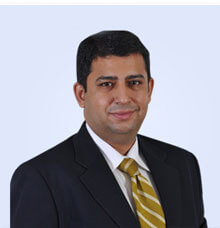
Sundeep Sikka
President and CEO
Reliance Capital Asset Management Ltd.
In an interview with ET Now, Sundeep Sikka, President & CEO, Reliance Capital Asset Management, shares his business outlook.
ET Now: How has life changed for you and for Reliance AMC after the deal with Nippon?
Sundeep Sikka: Nippon Life is one of the largest insurance companies in the world managing in excess of $600 billion. We are very happy to have partnered them.
In terms of engagement and risk management, Nippon brings much to the table. We have already been making international plans with Nippon. We have launched a couple of funds and raised a billion dollars. More such initiatives are coming.
ET Now: Post the deal, has your asset under management increased?
Sundeep Sikka: We have been working closely as a group with Nippon Life since 2011. It is one of the largest asset managers in the world. Post the deal, two things have changed for us - our global reach is up manifolds, and corporate confidence on us has risen owing to the risk management practices that Nippon has.
ET Now: People say that the retail investor is back, and that the SIP culture is here to stay. What has your experience been at Rel AMC?
Sundeep Sikka: Yes, the comeback of the retail investor is heartening. In last year alone, Rs 2 lakh crore of money came in along with 4 lakh new investors. The one marked change we've seen this time is that investors are clearly maturing.
Investors earlier used to come in only when the markets were going up. This time, despite the volatility, investors have been coming in. This is a very positive development. Also, investors are rewarding long-term performances of fund houses.
SIPs have been another key highlight. The number of SIPs has been increasing, and the average ticket size of SIP has also been increasing. What used to be about Rs 2000-2500 about three years back is now almost touching Rs 5000. As an industry, we get nearly about Rs 4000-5000 crore of equity money coming in every month. This is now a very strong counterbalance to the FII money which is volatile.
Another important change is that earlier most of this money came in from the big cities, but now we have seen investors coming in from very small towns. Especially companies like ours which have strong distribution networks have seen very healthy flows from small towns.
ET Now: What are your expansion plans?
Sundeep Sikka: We remain focussed on retail. We remain focussed on profitable growth. In this industry, 50% of the assets are basically owned by corporates. Our focus remains on equity, debt and retail investors.
To give you some numbers, while the industry has about 47% of the AUM from corporates, for us the number is as low as 30%. We are the largest asset manager in B-15 cities. What does that mean? Higher profitability. Last year the industry PAT in terms of AUM was 16 bps while we were at 29 bps.
This means we will continue focussing on asset classes and markets that are profitable. We won't be running blindly after top line. We want to be number one in number of investors, in performance and customer service. But we do not want to be number one just in liquidity.
Coming to our future plans, I understand that only 2% of the population are investing in mutual funds. This is just the start. Just think, the Jan Dhan scheme opened 30 crore bank accounts in six months. These accounts have in excess of Rs 50,000 crore of money lying. It is just a matter of time; I think all this money is going to also flow into financial products.
ET Now: If you have to pick and choose a product or an asset class, which according to you is the best one?
Sundeep Sikka: Long-term wealth is created by equities. But equities are volatile. The road to wealth will never be linear. It depends a lot on the state of the economy, on the state of the globe. But despite all this, if it's about long-term wealth, it has got to be equity.
But debt can't be ignored either. The way I see it, capital preservation will happen from the money market funds and debt funds, and long-term wealth creation from equities. So you need to have the right asset allocation - you have to be invested in all three.
As told to ET Now